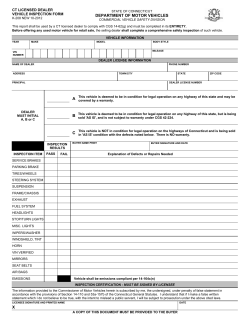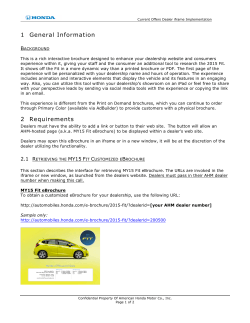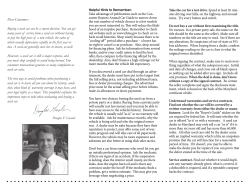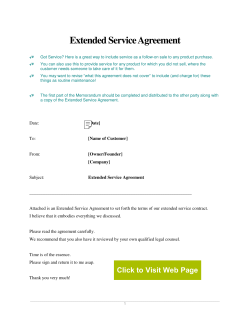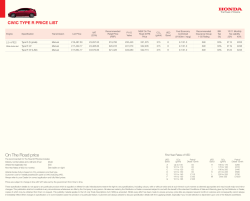
Document 157715
Euchre is a classic card game derived from a game made popular in the Alsace region of France called Jucker. It was very popular in Europe during the 18th century. Euchre reached the United States in the early 19th century and was the first game to introduce the joker as the highest trump. Euchre once held the crown as the #1 card game in the United States. Today, it is popular in the U.S. Navy. In fact, it is believed that it was through this maritime connection, the game traveled from America to other English 2 speaking parts of the world during the 19th century. Certainly in Britain, the game is mainly found in regions where there has been a strong naval influence. 3 British Euchre PLAYERS AND OBJECT Euchre is a plain-trick game for 4 players in fixed partnerships where the partners sit opposite from one another. 5 cards are dealt to each player. The object is to win at least three of five tricks, with an extra bonus for winning all five. RANK OF CARDS A pack of 25 cards is used consisting of A, K, Q, J, 10 and 9 in each of the four suits, plus a joker. The 2 of spades can be used as a substitute for the joker, if necessary.The trump suit has 8 cards ranking from highest to lowest as follows: 4 Benny, or Best Bower: Joker or 2 of spades Right Bower: Jack of the trump suit Left Bower: Other jack of the same color as the trump suit Ace King Queen 10 9 The other suits have 6 or 5 cards ranking as normal: A K Q J 10 9. Note that benny and left bower count for all purposes as belonging to the trump suit. For example, if hearts are trumps, the Jack of diamonds is considered heart, not a diamond. It can be played to a heart lead and if it is led, hearts must be followed. The word “bower” comes from the German word bauer, which means farmer or peasant, and is also a word for Jack. THE DEAL The first dealer is selected at random. The turn to deal then rotates clockwise throughout the game. The dealer shuffles and the player to dealer’s left may either cut or “bump”. To bump is to knock the cards to indicate that they should be dealt as they are, without cutting. Five cards are dealt to each player in two rounds. The dealer deals clockwise, giving each player a packet of two or three cards in any order. Any player who was dealt two in the first round gets three in the second round and vice versa. The dealer then turns the next card in the pack face up. This “up card” is used as a basis for selecting the trump suit. The remaining four cards are left face down and are not used. 5 MAKING TRUMP This process determines the trump suit and which team are the makers–the team that undertakes to win three tricks. First, each player in turn, beginning with the player to the dealer’s left, has the option of accepting the up card’s suit as the trump suit or passing. Specifically: • The player to dealer’s left may either pass or say “I order it up”. • If the first player passes, the dealer’s partner may either pass or say “I turn it down”. • If the first two players pass, the player to dealer’s right may either pass or say “I order it up”. • If all three other players pass, the dealer may either take up the up card, saying “I take it up”, or pass by saying “over” and turning the up card face down. If either of the dealer’s opponents order it up or if dealer decides to take it up, the suit of the up card becomes trump. The dealer adds the up card to his or her hand and discards a card face down. Note that, at least in this version of Euchre, the dealer’s partner cannot make trumps and play with a partner. The dealer’s partner can only make the turned up suit 6 trumps by playing alone. In Britain, this is done by saying “I turn it down”, in which case, the dealer’s cards are placed face down on the table and dealer’s partner plays alone with the turned suit as trump. If all four players pass, the up card is turned face down, and there is a second round in which players have the option to make any suit (other than the suit of the up card) trump. Again, the player to dealer’s left speaks first and may either pass again or name a suit. If the first player passes, the second may name a suit or pass, and so on. If all four players pass a second time, the cards are thrown in and the next player deals. Note that the “trump making” process ends as soon as someone accepts, or makes trump, rather than passing. That player and his partner become the “makers” and the other players are the “defenders”. If the benny is turned up, then the dealer’s team automatically becomes the makers. No one else gets an opportunity. The dealer must choose a trump suit without looking at his cards, and then picks up five cards, plus the benny, and discards one. GOING ALONE After trump has been made, but before the first lead, any player may announce that they 7 are playing alone. The partner of a lone player puts his or her cards face down and takes no part in the play. Either a member of the maker’s or defender’s team may play alone. However, it is possible that both a maker and a defender choose to play alone, which would leave only two active players. THE PLAY If all four players are in the game, the play begins with the player to the dealer’s left leading the first trick. If one player is playing alone, the person to that player’s left leads first. If two players are playing alone, the defender leads. Any card may be led. Each player in clockwise order must follow suit by playing a card of the same suit as the card led, if possible. A player who cannot follow suit may play any card. Remember that, for purposes of following suit, the benny and the left bower are considered to belong to the trump suit and not to any other suit. The trick is won by whoever played the highest card of the suit led unless a trump was played, in which case the highest trump wins. The winner of each trick leads the next one. 8 SCORING If all 4 players are playing, then the scores are as follows: • If the makers win three or four tricks, they score 1 point. • If the makers win all five tricks, they score 2 points. • If the makers take fewer than three tricks, they are “euchred”, and the defenders score 2 points. If a member of the maker’s team is playing alone and wins all five tricks, the team scores 4 points instead of 2. Otherwise, the scores are as above. If a member of the defenders’ team is playing alone and succeeds in winning at least three tricks, thereby euchring the makers, the defenders score 4 points instead of 2. Otherwise, the scores are as above. The game is normally played to 11 points. That is, the first team that reaches 11 or more points over several deals wins the game. It is common for each team to keep score using a spare 5 and 6 from the deck, as these cards are not used in the game. The cards are 9 arranged on the table so that the number of pips displayed shows the team’s current score. Sometimes people play to 15 points (using a 7 and an 8 to keep score) or to 10 points. 6-PLAYER EUCHRE In Cornwall, England, this is played between two teams of three, sitting alternately. Players may either add the 7s and 8s to the pack, totalling 33 cards (the 8 and 7 are then the lowest cards of each suit, below the 9), or play with a double 25-card pack – 50 cards in all. When playing with a double pack, if two equally high cards are played to a trick, the second one played beats the first. If the two bennies are red and black, the one which is the same color as the trump suit beats the other. If they are the same, then the second one played beats the other, as with other cards. If a player wants to play alone, both of the player’s partners discard their hands face down, but the lone player can ask one of them for a card. The partner asked gives a card of his choice to the lone player, without consultation and without showing it to the others. The lone player discards one card face down in return. The score for winning all the tricks, or euchring, the makers is 3 points instead of 2. If the winner is playing alone, the score is 6 points instead of 4. 10 North American In the United States and Canada, euchre is played without a joker. There are just 24 cards in the deck, and the right bower is the Euchre highest trump. The target score is 10 points instead of 11. The score is indicated by using two low cards overlapped. Some use a 6 and a 4, some use two 5s, and some use a 2 and a 3 like this: In the USA, any player, including the dealer’s partner, is allowed to order up the up card and play with a partner. In other parts of the world, such as Australia, England and Canada, if the dealer’s partner orders the card up, he or she must play alone. Therefore, the dealer’s cards are laid face down, and the dealer does not play the hand. Some people do not allow a defender to play alone. Only the maker 11 is allowed to play alone. Some only allow a defender to play alone against a lone maker. In Canada, it is uncommon to cut the cards before dealing, and in many groups the cards are dealt one at a time, rather than in twos and threes. A common method of choosing the first dealer is to deal the cards around until a black Jack appears. Stick the Dealer (also known as “Screw the Dealer”). In this variation, the dealer cannot pass a second time when naming the trump suit. On the second round, if the first 3 players pass, the dealer must name a suit. This variation is often played when playing time is limited. The Super-Euchre. This occurs when the makers take zero tricks. Some play that the defenders then automatically score 4 points. Railroading. This is a variation in which, if your partner is going to play alone, you may pass your partner a card (your best card, for example) face down. Before looking at this card, your partner must choose whether to discard a card from his or her hand and take the card offered in exchange, or to discard the offered card. 12 Variations Some people play that if the first 3 players pass, the dealer is only allowed to take up the turned trump if already holding at least one trump in hand. For this purpose, the left bower is not counted as a trump. 32-CARD EUCHRE The 8s and 7s are included in the pack as the lowest cards in each suit, making a pack of 32 or 33 cards. This makes it more uncertain whether the high cards are in play. 32-card euchre is the standard version for players in New Zealand. There are a few people in the USA who still play this way. 6-HAND ALMONTE EUCHRE Rules are the same as 6-player euchre, but with the following variations. There are 6 players (3 per team) using a 30 card deck consisting of 8-9-10-J-Q-K-A in each suit, plus three jokers represented by the 2, 3, and 4 of spades ( 4 is the highest trump, followed by 3, 2, right bower, left bower, A, K, Q, 10, 9). The dealer distributes five cards to each of the 6 players and then 13 turns over the last one. There are no hidden cards. If the card turned up is a joker, then the dealer calls the trump before looking in his or her hand. Scoring is the same as for British 6-player euchre, but play is up to 15. In euchre leagues, players play twice around the table (12 hands) before moving to another table. There is a version where, if a joker is turned up, the dealer cannot turn it over at the end of the first round of bidding. Instead, the dealer must take it into his or her hand and become the maker, assuming the other 5 players have passed on the called trump. A 4-hand variation is played with 21 cards: J-Q-K-A of clubs and diamonds, 10-J-Q-K-A of hearts and spades, plus 3 jokers. Scoring is the same as in 6-hand. 14 Terminology and Sayings FROM ENGLAND Have an Eye: have a score of at least one Whitewashed: to have lost without scoring (example: 11-0) Dockyard Play or Playing Policeman: opponents of dealer who do not order up with good cards with the hope of euchring the dealer’s team FROM NORTH AMERICA Don’t Send a Boy to the Mill: said when you trump a suit trick with a 9 or 10, for example, and the other opponent takes it with something higher Crossing the Creek: when the top card is turned down and someone makes trump of the opposite color Dutchman’s Point: the point you win when you’re holding both bowers and the Ace of trump (When the joker is not used, these are the highest three trumps.) 15 Bushing or Waiting in the Bushes: passing when you hold enough cards to make trump, hoping instead to euchre the opponent who picks up Having a Dog from Every County: your 5 cards include all four suits, usually low cards To be set: to be euchred Sweep or March: win all the tricks In the Barn: 1 point away from victory (usually 9 points) To get cut: lead an Ace that gets trumped by the first opponent Loner: a hand suitable for playing alone Lay-down Loner: a loner consisting of unbeatable cards (for example, if you have the first lead: right, left, trump Ace, another trump, any off Ace) Note: This is not lay-down if the lone player does not have the first lead. There is a variation played where if you play a loner, you never get the lead. If the player to your right leads first, you would need five trumps including the top three for a lay-down loner. 16 If the player to the left of the loner leads, then five trumps including two bowers is enough. Walk: a low card is led and takes the trick (usually expressed in amazement or disgust: “The Queen walked!”) Next: After the up card is turned down, the player to the dealer’s left may call “next” to indicate that the same color suit as the turned down card is to be named the trump suit. © 2011 John McLeod / pagat.com Score Area 17 5101 Highland Place Drive | Dallas, TX 75236 cartamundiusa.com The public is hereby notified that exclusive rights are claimed to the various names, numbers, face and back designs, box designs and other distinguishing characteristics of our brands of cards.
© Copyright 2025


